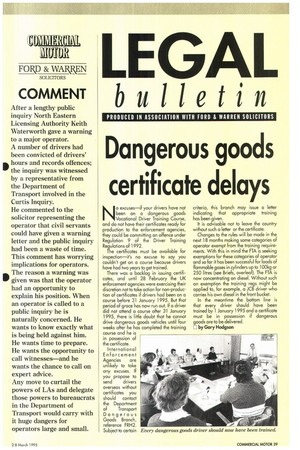Dangerous goods certificate delays
Page 41

If you've noticed an error in this article please click here to report it so we can fix it.
No excuses—if your drivers have not been on a dangerous goods Vocational Driver Training Course, and do not have their certificates ready for production to the enforcement agencies, they could be committing an offence under Regulation 9 of the Driver Training Regulations of 1992.
The certificates must be available for inspection—it's no excuse to say you couldn't get on a course because drivers have had two years to get trained. There was a backlog in issuing certificates, and until 28 February the UK enforcement agencies were exercising their discretion not to take action for non-production of certificates if drivers had been on a course before 31 January 1995. But that period of grace has now run out. If a driver did not attend a course after 31 January 1995, there is little doubt that he cannot drive dangerous goods vehicles until four weeks after he has completed the training course and he is in possession of the certificate. International Enforcement Agencies are unlikely to take any excuses, If you propose to send drivers overseas without certificates you should contact the Department of Transport Dongerous Goods Branch, reference FRH2. Subject to certain criteria, this branch may issue a letter indicating that appropriate training has been given. It is advisable not to leave the country without such a letter or the certificate.
Changes to the rules will be made in the next 1 8 months making some categories of operator exempt from the training requirements. With this in mind the FTA is seeking exemptions for these categories of operator and so far it has been successful for loads of flammable gases in cylinders up to 100kg or 250 litres (see Briefs, overleaf). The FTA is now concentrating on diesel. Without such an exemption the training regs might be applied to, for example, a JCB driver who carries kis own diesel in the front bucket.
In the meantime the bottom line is that every driver should have been trained by 1 January 1995 and a certificate must be in possession if dangerous goods are to be delivered.
0 by Gary Hodgson




























































































